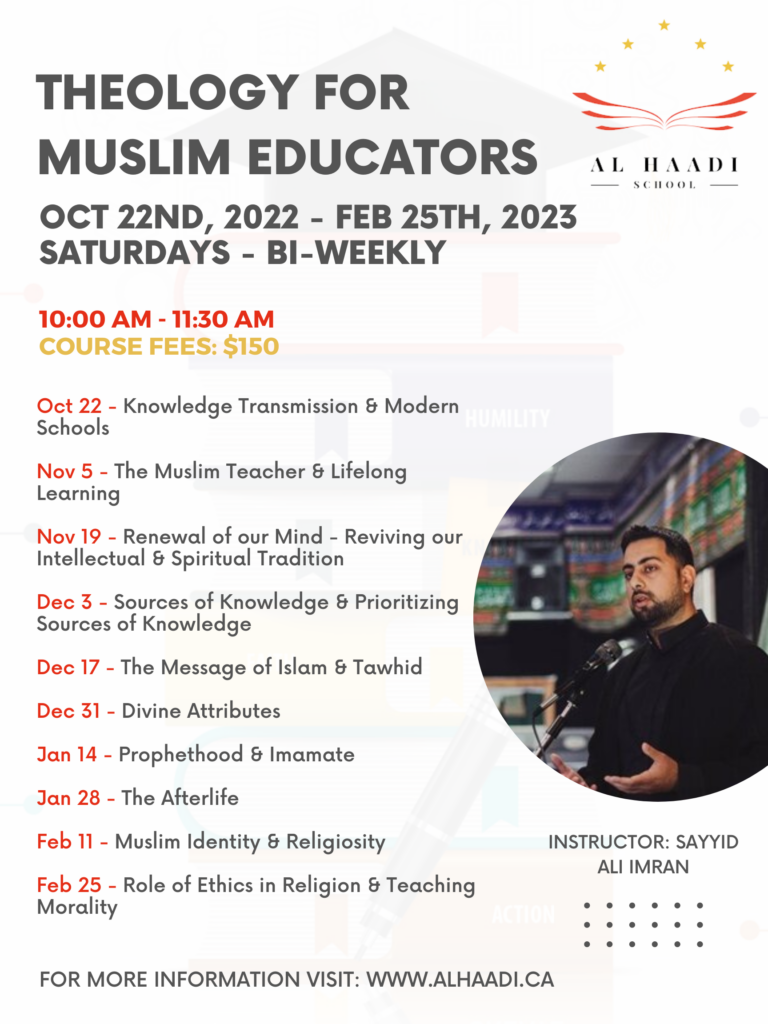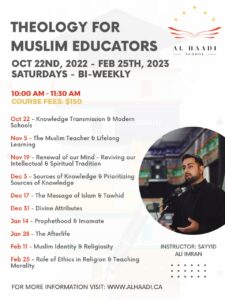Registration Link: https://forms.gle/aC24coo3GaPAzToL6
Course Instructor: Sayyid Ali Imran
Date: Saturdays – Bi-Weekly
October 22nd, 2022 – February 25th, 2023
Time: 10:00 AM – 11:30 AM EST
Course Fees: $150 CAD / $115 USD / $170 AUD / £100 GBP
Online – Live participation on Zoom (recording available for registrants).
Once registered, we will review your application and send you a confirmation email with payment methods.
For more information, please email [email protected]
Course Description
This course offers a brief overview of discussions pertaining to Islamic theology and identity that concern Muslim educators teaching in Islamic schools. Lessons will focus on merely introducing and outlining both theoretical principles related to Islamic epistemology and modes of reasoning, key theological concepts, as well as ethical and practical implications of these beliefs in a classroom setting.
This course may be a prerequisite for later modules. Each lesson will be a minimum of 90 minutes of instruction time.
Pre-Requisites
Students should have a minimum of bachelor’s degree or a college certificate in a relevant field and/or be working as an educator or working towards becoming an educator.
Course Outline
1. Oct 22nd 2022: Knowledge Transmission & Modern Schools
The role of an educator is to impart knowledge and nurture students. They are vessels by which knowledge is transmitted from one generation to another. What do we know about the phenomenon of knowledge transmission, how was knowledge transmitted in the past in Muslim societies, and how can knowledge be effectively transmitted in the modern schooling system?
2. Nov 5th 2022: The Muslim Teacher & Lifelong Learning
What does it entail to be a teacher and educator at an Islamic school? What differentiates a Muslim teacher from a secular or non-Muslim teacher? What are some pertinent qualifications required to be an effective Muslim teacher?
3. Nov 19th 2022: Renewal of our Mind – Reviving our Intellectual & Spiritual Tradition
What is our role as Muslim educators in the 21st century in particular? An analysis of how civilizations are built upon a culture of intellectuality and spirituality and how Muslim educators must be equipped in both dimensions to better confront the challenges of modernity.
4. Dec 3rd 2022: Sources of Knowledge & Prioritizing Sources of Knowledge
What are the sources of knowledge for Muslims? An overview of Revelation, the Intellect (‘Aql), transmitted knowledge (Ḥadīth), intuition, referring to specialists, induction etc. How do we maneuver through the different sources of knowledge and how do we reconcile conflicts and contradictions between the knowledge output of these sources?
5. Dec 17th 2022: The Message of Islam & Tawhid
The most important creedal doctrine in Islam is Tawḥīd. In this lesson we will discuss the different aspects of Tawḥīd as expounded on by Muslim scholars: Tawḥ Dhātī, Ṣifātī, Khāliqī, Rubūbī, and ‘Ibādī. What do these theological beliefs mean practically in our day-to-day life? What kind of culture does Islam promote and encourages us to build? What is the overall message of Islam, and what purpose and meaning does it give to human life? Why is this message ever so important to actualize in the modern era?
6. Dec 31st 2022: Divine Attributes
What comes into our minds when we think of God is the most important thing about us. Who you believe God to be and what He is like is the single most important factor in the life of a Muslim. God in the Islamic worldview possesses numerous Divine Attributes and Names and becoming familiar with these Attributes leads to a more meaningful life. A mediocre understanding of these Attributes leads to a low and base living. Why was the discussion on Divine Attributes important for Muslim scholars? What practical impact does the knowledge of these attributes have on our lives?
7. Jan 14th 2023: Prophethood & Imamate
If Muslim educators are to impart the teachings of the Prophets (p) and the Imams (a), then it is imperative to know the role and purpose of Prophets in Islam. What are some basic proofs establishing his Prophethood? How did the Prophets go about fulfilling their objectives and what makes the final messenger, Prophet Muhammad (p), unique from the rest of the Prophets (p)? Why is Imamate – Divine Leadership – seen as an extension of Prophethood? What is the difference between Prophets and Imams? What is the role of the Imams (a) and what are the greater implications of the concept of Wilayah?
8. Jan 28th 2023: Afterlife
The Quran puts great emphasis on the afterlife and ensures people hold on to this belief of the unseen. What is the relationship between this world and the hereafter, and how does this relationship impact the daily social behavior of Muslims? How should Muslim educators bring up and discuss the concept of the afterlife in school settings, particularly with younger children?
9. Feb 11th 2023: Muslim Identity & Religiosity
Over the last century, one of the most pressing discussions has been around Muslim identity and its links to religiosity. Many Islamic schools were opened for the mere purpose of “preserving an Islamic identity”, but what exact factors led to the emergence of this discussion? Why have Muslim communities struggled to address issues of identity? Is Islamic identity a static concept or an ever-changing variable? What exactly is it to begin with?
10. Feb 25th 2023: Role of Ethics in Religion & Teaching Morality
One of the core aspects of any Muslim’s identity is ethics and good morals. What is the role of ethics in Islam, and how is it different from sacred law? What is the relationship between law and ethics, and what steps can be taken to ensure ethics remain integrated within the law? What are some of the key ethical virtues Islam expects every Muslim to have as part of their identity? One of the most challenging, yet crucial responsibilities of a Muslim educator is the teaching of morality and ethics to students. What are some principles and methods educators can employ to teach morality to students? How does Islam see the role and relationship between the teacher and the student vis-à-vis teaching morality?


